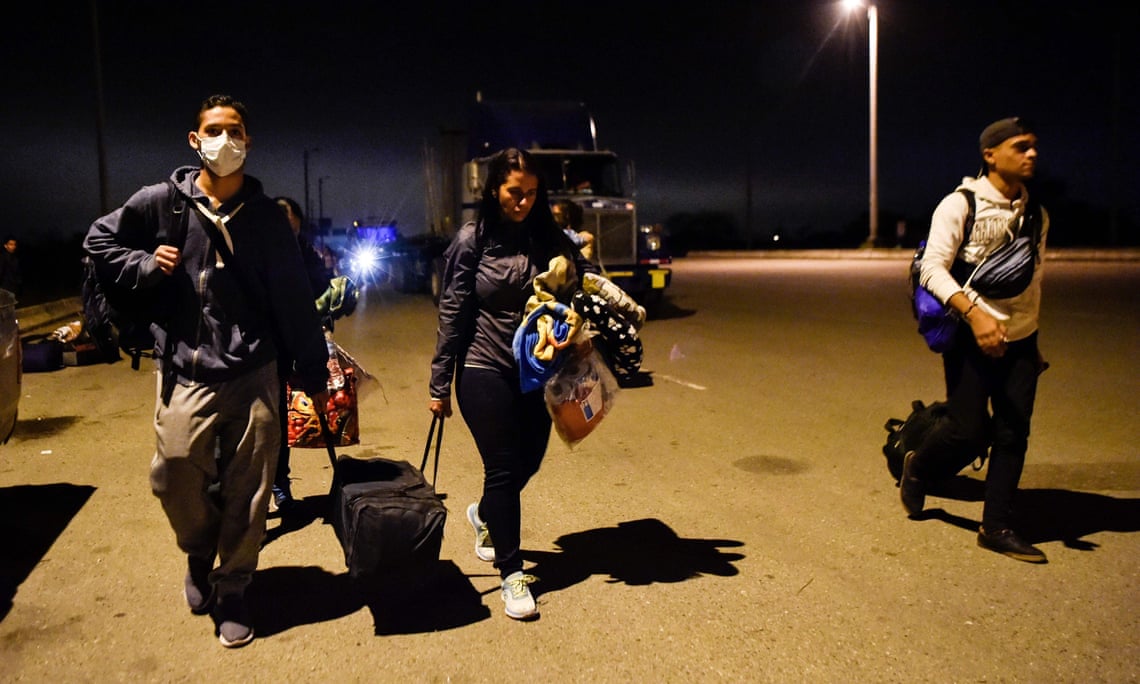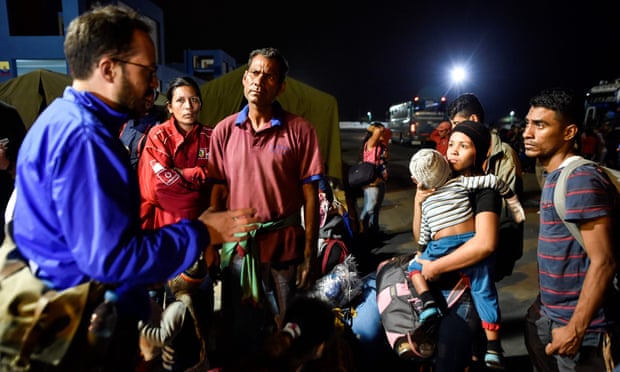Day after day the crowds flock to the Expresos Flamingo bus terminal in Caracas to begin checking out of their crumbling nation.

Some carry their earthly possessions in suitcases or backpacks, others plastic bags containing water and snacks for the long journey ahead. All share a dogged determination to escape.
“Food became so expensive that for months we weren’t able to eat three meals a day,” says Harry Flores, 41, who has been queuing for nine days with his family in the hope of boarding a bus to Peru.
Many Venezuelans fleeing abroad are adamant peaceful solution is no longer possible
When he does secure those seats, Flores, an unemployed computer engineer who sold his car to bankroll the trip, will join a historic exodus from what was once one of South America’s wealthiest and most stable societies.
The UN estimates that 2.3 million Venezuelans have fled since 2015 with Colombian authorities predicting 2 million more could follow by 2020. That would mean some 4.3 million people – 14% of Venezuela’s population – had taken flight.
Hundreds more made it into Peru through its northwestern border on Saturday despite new rules preventing Venezuelan migrants from entering without passports, which many lack because of the upheaval in their country. “We must act humanely with this vulnerable population,” said Abel Chiroque, the local ombudsman.

Last week the Venezuelan president, Nicolás Maduro, vowed to reverse the country’s slide into hyperinflation and deprivation with what he called a visionary plan for recovery, growth and economic prosperity.
Maduro’s “revolutionary formula” includes lopping five zeros off the old inflation-stricken currency, the bolívar, and introducing a new one, the sovereign bolívar, as well as raising the monthly minimum wage by nearly 6,000% from next month.
“This is my economic recovery programme. It’s mine! And when I say it’s mine, I mean: it’s the people’s,’” Maduro tweeted on Wednesday, a day after his country was rocked by a 7.3-magnitude earthquake that some interpreted as a political metaphor for his teetering regime.
Few experts believe Maduro’s measures will produce the economic miracle he promises.
“There is zero chance it will work,” said Javier Corrales, a professor of political science at Amherst College in the US and the co-author of a book on Venezuela’s political and economic decay called Dragon in the Tropics.

“The one big lesson – especially from Brazil, which had many years of four-digit annual inflation – is that just dropping zeros from your currency doesn’t do it. The new measures do nothing to solve the two basic structural problems that are causing inflation: the deficit, which is probably around 15–20%, and, secondly, the expectations on the part of people that the currency has no backing anywhere,” added Corrales.
In Venezuela, the plan has added bewilderment to the growing sense of despair.
Advertisement
“When I went to the market today some prices had almost doubled,” complained Edelia Zambrano, a 31-year-old risk analyst from Caracas.
Sandra Campos, a 32-year-old accountant, suspected she had been overcharged for her breakfast because of the befuddling new system. “The clerk charged me 50 times the price, because she confused the numbers. There’s too much confusion.”
Uncertainty, too, surrounds the fate of Maduro, a 55-year-old former bus driver [£] and foreign minister who became custodian of Hugo Chávez’s Bolivarian revolution after his mentor’s 2013 death but has overseen the country’s economic collapse.
Just this year two plots to bring Maduro down have reportedly been foiled – one in May when a conspiracy involving top military officials codenamed Operation Constitution was thwarted, and another in early August when two explosive-laden drones failed to reach their target during a rally in Caracas.
Many of the Venezuelans fleeing abroad are adamant a peaceful solution is no longer possible. “We’ve got to get him out: to eliminate him,” said Carlos Briceño, a 37-year-old from Maracaibo, as he queued to cross from the Colombian border town of Ipiales into Ecuador last week.
Harold Antanas Trinkunas, a Venezuela specialist at Stanford University, said such scheming would inevitably persist, meaning Venezuelan and Cuban spies would need to be on constant guard against “outlandish” if amateurish attempts to kill Maduro.

If, as seemed likely, Maduro’s economic plan failed to stop the rot an Arab spring-type uprising was also possible which could lead to “a very unpredictable outcome as we saw in the Middle East and North Africa”.
Advertisement
Trinkunas added Maduro might also be purged by his inner circle and replaced with “a more competent strongman” such as longtime rival Diosdado Cabello.
For now, however, Venezuela’s president appears to be in control. “He seems to have put down potential challengers, he has purged the military a little bit after this drone attack and the Constitution [plot], he seems to be keeping Diosdado Cabello at bay and has definitely made himself very much the front and centre of these new economic reforms. So my guess is that his hold on power is better than it was maybe a year ago,” said Trinkunas.
Corrales also saw the most likely challenge coming from within but said Venezuela’s leadership had proved surprisingly resilient.













